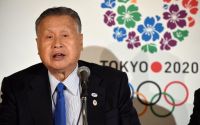Cash and prestige drive race for Tokyo Games place
AFP SPORTS FEB. 12, 2015

LAUSANNE —
An army of sports—from baseball to wushu—is battling for a place in the 2020 Tokyo Olympics with cash as much as prestige the driving force.
Hundreds of millions of dollars in television revenues will be handed out to the lucky federations that get a place in the Tokyo summer games.
Reforms to the Games made by the International Olympic Committee (IOC) in December will allow the Tokyo organisers to propose one or more new sports for the program.
The Japanese organisers have until September to make up their minds. A long list of sports is already knocking on the door and the lobbying will intensify while the Olympic movement makes a decision.
Baseball and softball, which were dropped after the 2008 Beijing Games, are considered favorites for a return. Professional baseball is a top sport in Japan.
But street basketball, billiards, karate, sport climbing, squash—who like a joint baseball/softball bid lost out in 2013 to wrestling—surfing and wushu all think they deserve a chance—on merit and because of the reforms pressed through by IOC chief Thomas Bach.
A place in the Olympic village brings publicity and money. As one third of the Games television rights are given to the sports federations represented.
After the 2008 Beijing Games, $295 million dollars were handed out. This rose to $515 million for the 2012 London Games. For the Winter Olympics, $210 million was handed out after Vancouver in 2010.
After the 2016 Olympics in Rio de Janeiro, athletics, swimming and gymnastics will get the biggest shares of the TV pot.
“There’s big revenue involved, especially for some small sports,” said Calum Murray, editorial director for Sportcal, a sports marketing website.
He said some of the Olympic sports would not exist without this television money.
But some of the specialist sports reject the notion that they are also-rans in the Olympic contest.
Archery sets out its case that it was one of the first Olympic sports.
“Since London 2012, World Archery has seen an increase in membership around the world of 25% – at a conservative estimate – with many new athletes citing the competition at the Games as influencing their decision to take up the sport,” said Tom Dielen, general secretary of the international federation.
New competition rules have been introduced to add excitement and try to attract television cameras.
The increased membership and improved marketing have helped archery reduce its dependence on Olympic money, Dielen added.
The London Games featured 26 sports and normally the IOC does not want more than 28. But under the new rules it has only set a maximum number of gold medal events—310—and a limit of 10,000 athletes.
While many want more variety and to modernise the games, adding a new medal event will mean some will have to be cut somewhere.
And while there is much speculation about which sport will be added, key federations are also worried about losing events.
Talk in Olympic circles has been about athletics’ triple jump or even the 10,000 meters race being cut.
Synchronised swimming and modern pentathlon—which to many people’s surprise survived the last time the sports were reviewed in 2013—have also been tipped for the chop.
Athletics accounts for 47 gold medals and seems the most vulnerable. But Sebastian Coe, who is standing for the international athletics federation (IAAF) presidency, has insisted that all events are “important”.
Cornel Marcelescu, executive director of the international swimming federation, FINA, shot down any suggestion of reducing swimming events.
“The swimming program at the London Games had the biggest television audience,” Marcelescu told AFP. “With this success we want to increase the number of events.”
The IOC will not make a final decision on the new sports until August, 2016 which leaves plenty of time for fierce lobbying.
And no matter who wins in Tokyo, the battle will not end there. International Wushu Federation executive vice president Anthony Goh said that his sport has an “excellent chance” for 2024.



